The Armata Festival and the Allure of Spetses...
Experience Spetses in its most enchanting...
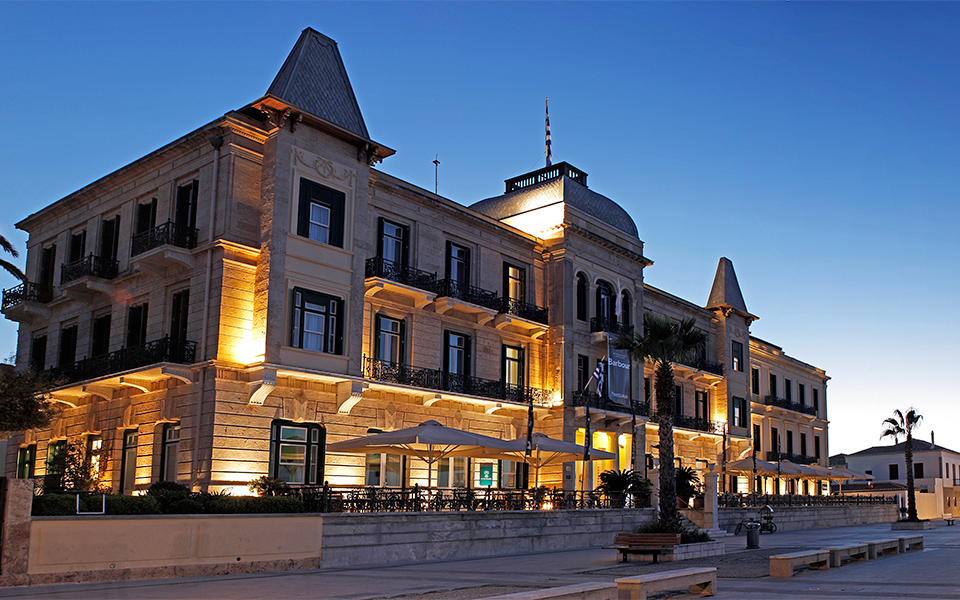
The Posiedonion Grand Hotel in Spetses
© Nikos Kokkas
On a map, the island of Spetses looks fairly unremarkable, like a small fragment that has broken off from the Peloponnese. Yet this small island has managed to be a key player in modern Greek history, with a reputation and a grandeur that belies its size. And far from being tucked away in history books this legacy is written across the face of the island. Here are just some of the sights that set Spetses apart:
Spetses is the only island in Greece where, upon swanning into the main port your eyes instantly alight upon a very large and very grand hotel. The epitome of timeless elegance, the historical seafront Poseidonion Grand Hotel, built in 1914, is the oldest on any Greek island. It hosted some of its most most exuberant events in the 1920s, when Athenian high society and international royalty alike flocked to its ballrooms and bedrooms during cosmopolitan weekends.
Having been renovated in recent years, it continues to be booked out by high-profile Greeks and globetrotting glamourati. They come here for the plush accommodations, highly skilled and attentive service, the award-winning gourmet restaurant, as well as to enjoy a year-round array of exciting events organized by the management. These range from the Tweed Run every April, May-day wreath-making, regular cycling trips around the island, children’s art workshops and glittering cocktail parties.
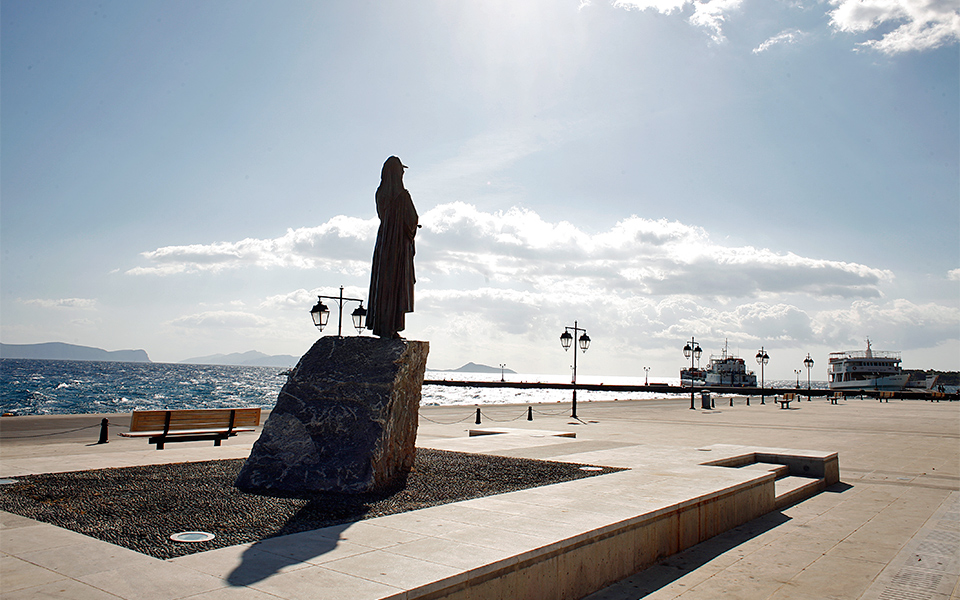
The statue of Bouboulina in front of the Poseidonion Grand Hotel
© Nikos Kokkas
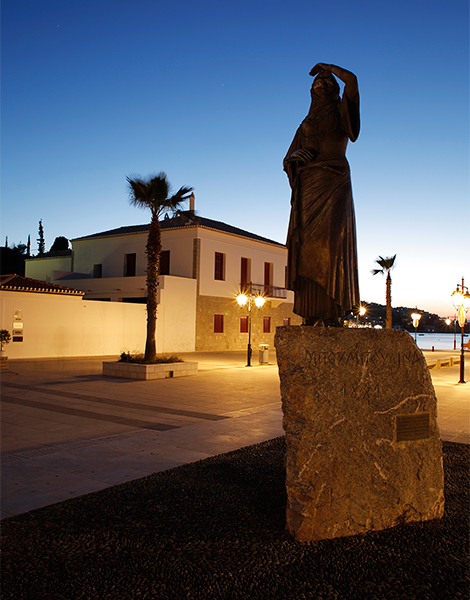
It is said that Bouboulina's gaze changes with the time of day
© Nikos Kokkas
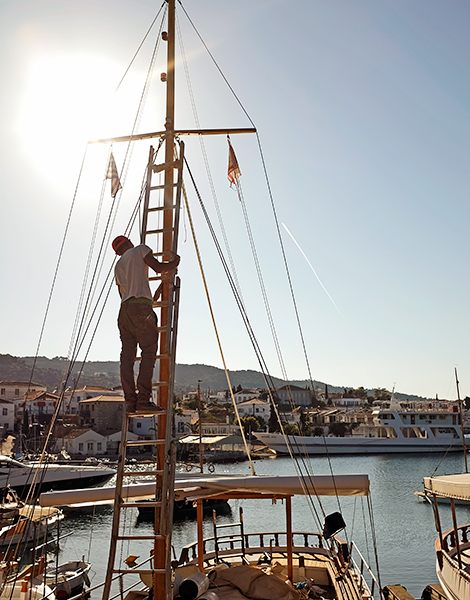
Spetses's tradition of shipbuilding is still alive in the old harbor
© Nikos Kokkas
The sheer size and grandeur of the Poseidonion renders the imposing statue of War of Independence heroine, Laskarina Bouboulina in its foreground almost invisible at first view. But she soon comes into sight, shading her eyes with her hand as she looks out to sea (in the direction of Hydra). Created by sculptor Natalia Mela, the defiant grey figure of the ‘Kapetanissa’ (female naval commander) has a gaze that, according to locals, appears to change throughout the day, going from concerned at night to fiercely courageous during the day.
Only five minutes away is the Bouboulina Museum; once the heroine’s home, the estate has stayed in the same family and contains many of her original belongings. Attending one of the daily educational tours is well worth it, as the mansion and Bouboulina’s own life story are utterly captivating.
Born in a prison, Bouboulina married twice. After her second husband – a wealthy captain and shipowner – was killed fighting Algerian pirates, she took over and expanded the business. An key member of the Filiki Etairia (the underground movement that played a key role in Greece’s fight for independence) she went on to build and command her own warships, taking part in numerous naval battles. Bouboulina survived the war but her life was tragically cut short when she was murdered in a family feud.
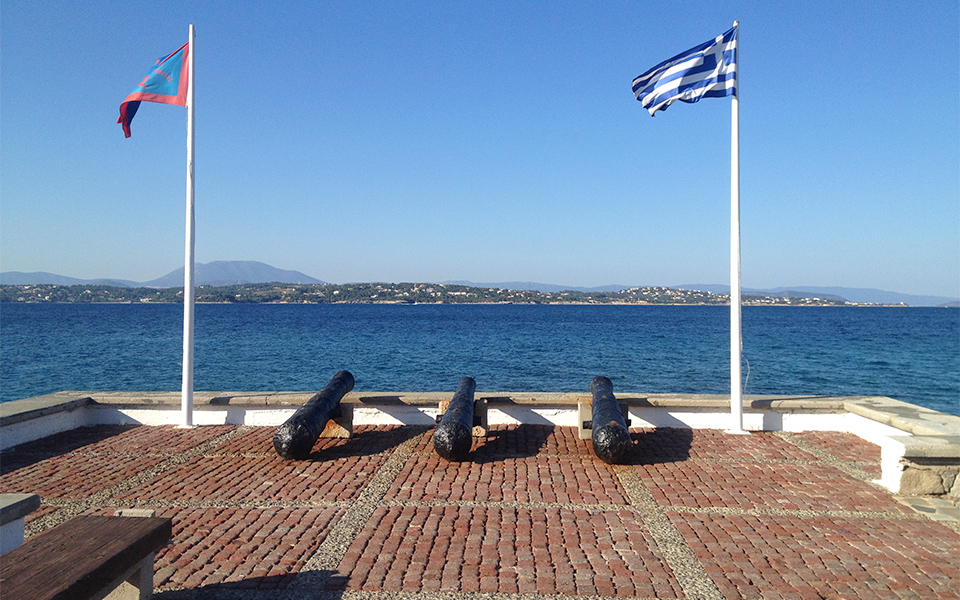
Cannons that once defended Spetses
© Alexia Amvrazi
Spetses, with its long naval history and shipping wealth, played an important role in fighting the Ottomans, taking part in the late 1700s in the Orlov Revolt – a precursor to Greece’s War of Independence of 1821. At the outbreak of the latter, the island was the first to raise the flag symbolizing resistance. Its naval forces are also thought to have been integral in the ultimate defeat of the Ottomans.
This turbulent history is still evident today: everywhere you go you will see cannons, and many mansions still have special openings from which the inhabitants could fire weapons at their enemies.
On September 8, the island hosts the Armata Festival commemorating a famous battle in 1822. Then, a naval fleet led by Admiral Andreas Miaoulis comprising of ships from Spetses, Hydra and Psara clashed with an Ottoman fleet. In a major victory for the Greeks, the Ottomans were ultimately forced to retreat after their flagship was torched.
Every year huge crowds descend on Spetses for the event that is celebrated with fireworks, dancing and the burning of a large wooden model of the Ottoman ship out in the bay.
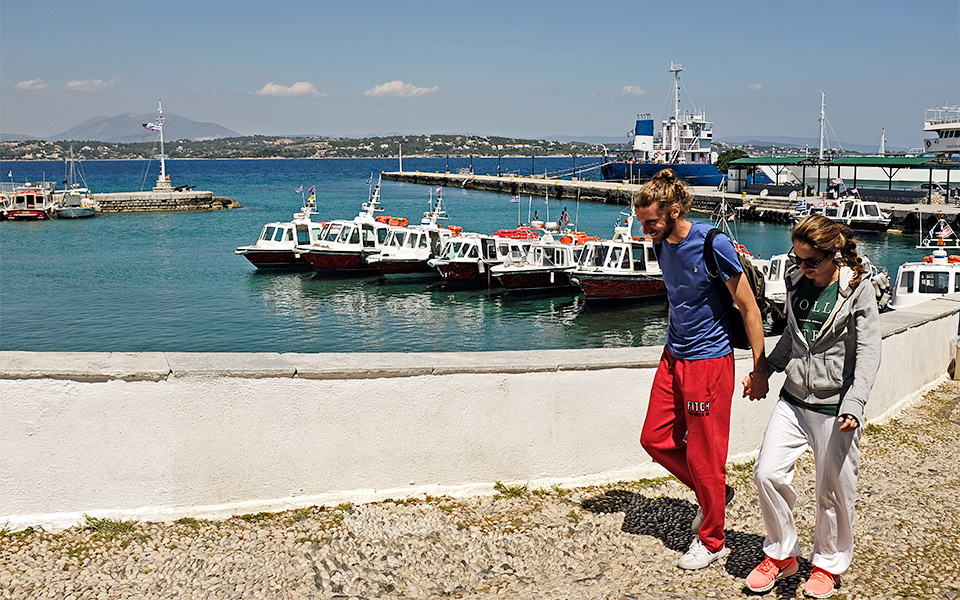
Water taxis are one of the primary modes of transport around Spetses
© Nikos Kokkas
Lined up at Dapia port, instead of yellow cabs on the road you’ll find water taxis bobbing up and down by the cafes. Spetses strictly regulates the number of cars allowed on the island (although motorbikes buzz quite noisily all around, and ordinary taxis pop in and out of the main town). As such, water taxis form one of the main ways of getting around the island or popping over to nearby destinations like Kosta in the Peloponnese, and Hydra a little further on. All destinations and prices are listed by the water taxi rank at Dapia port.
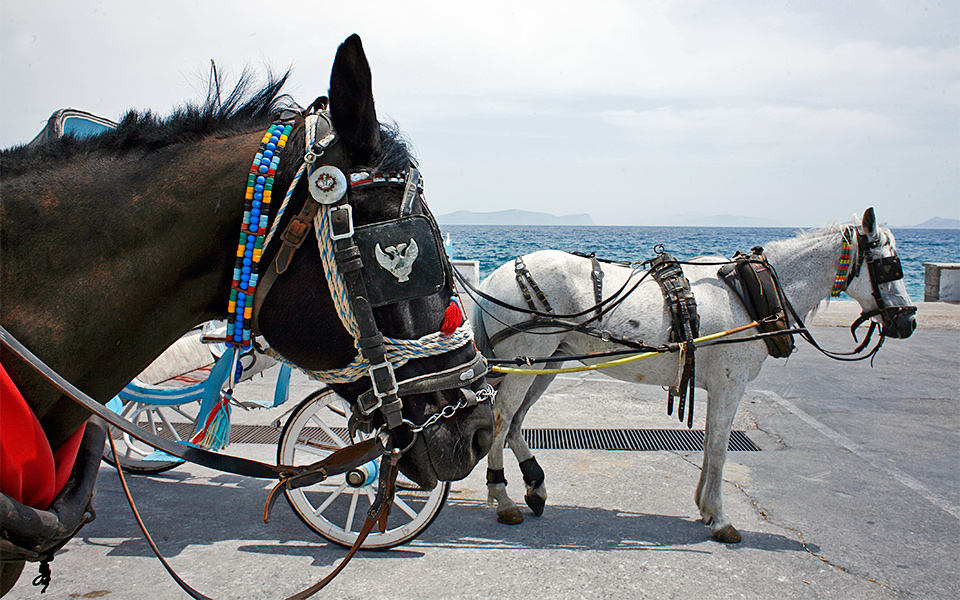
© Nikos Kokkas
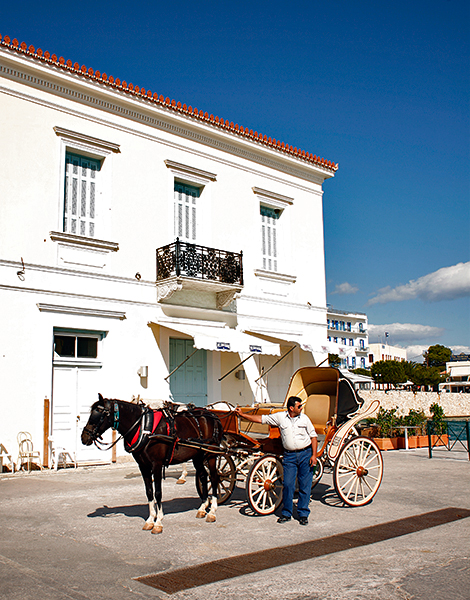
A horse and carriage awaits passengers in the main port of Dapia
© Nikos Kokkas
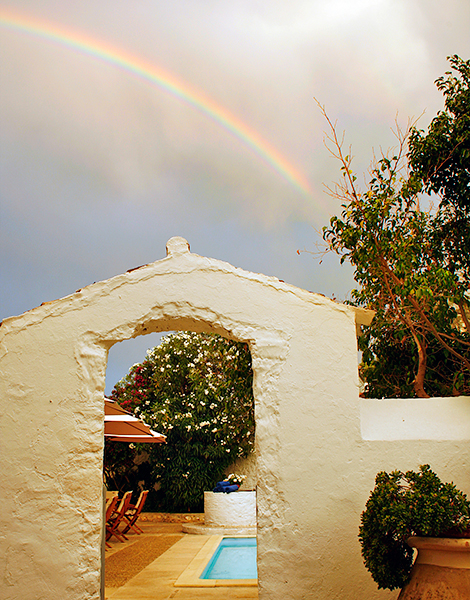
© Nikos Kokkas
The island’s romantic old-fashioned allure is only enhanced by the presence at the port of several horse-drawn carriages that take visitors on scenic tours from the main port of Dapia to the Old Harbour with its traditional shipyards. The colourful costal journey is lined by striking neoclassical mansions, many of which have belonged to the same family for generations.
The 20-minute journey also passes the Aghioi Pandes Monastery, which has an elaborately sculpted bell tower, and soon after the island’s Cathedral of Aghios Nikolaos. At the end of the Old Harbour, hidden in a thick pine forest, is the church of the Panagia Armata.
Starting from Dapia, the horse carriages also head in the opposite direction to the scenic area of Kounoupitsa, where there are beautiful homes and some tavernas to visit against the backdrop of a glittering sea. Carriages can be booked for scenic rides that will return you to your starting point, or for shorter one-way journeys.
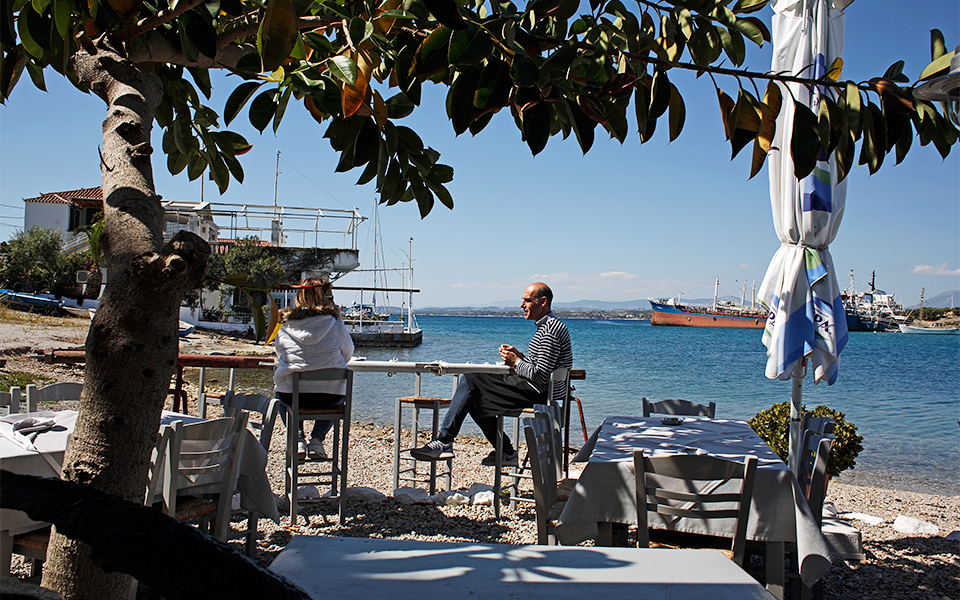
You can't get more waterfront than at Tarsanas fish restaurant
© Nikos Kokkas
Choices for enjoying super fresh, artfully cooked fish abound on Spetses. The demanding jet-set crowd has established a high standard for fresh, simple, yet fine dining that comes at a price but is well worth it for any seafood aficionado. Enjoy delights that go straight from sea to table such as tuna served raw or lightly seared, sea urchin eggs (ahinosalata), lobster and langoustine pasta, fresh crab salad and many more.
All fish restaurants also serve the classic local fish specialty ‘a la Spetsiota’ – usually tender white fish topped with a sauce made from fresh tomatoes, white wine and delicate herbs. Fish restaurants where you may also find yourself rubbing shoulders Hollywood stars or royalty include Liotrivi, Mourayo and Tarsanas in the Old Harbour; book a waterside table at least a few days early during high season.
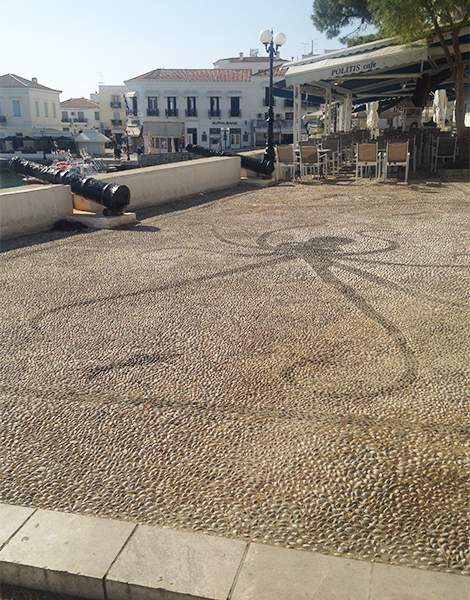
An octopus at the main port of Dapia
© Alexia Amvrazi
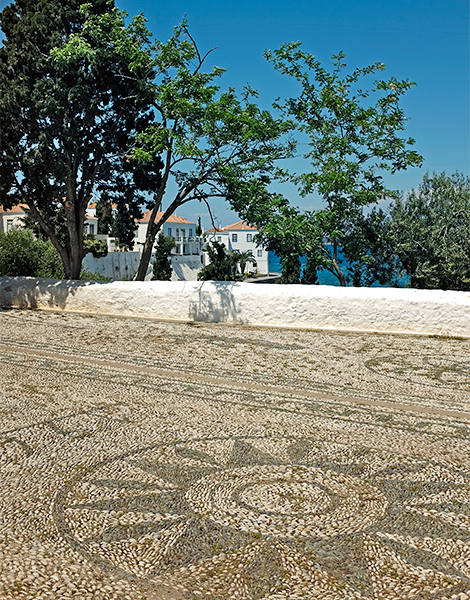
Intricate patterns can be seen in the courtyard of the church of Aghios Nikolas
© Nikos Kokkas
Once you’ve started to grow accustomed to Spetses’ resplendant features – the elegant architecture, turquoise sea, glossy boutique windows, sail-boats, water taxis and super yachts, you’ll momentarily lower your eyes enough to finally observe the street beneath your feet.
Another remarkable sight lies right there, in the form of a giant octopus, the flower of life, dates, anchors, suns and many more motifs, all created using dark and light pebbles. The art of ‘votsaloto’ pebble designs is not unique to Spetses – it can also be seen on Mytilini, Chios, Leros and other Aegean islands. But when even the ground beneath your feet exudes taste and charm, you know you’re in a special place.
Experience Spetses in its most enchanting...
From olive presses and traditional costumes...